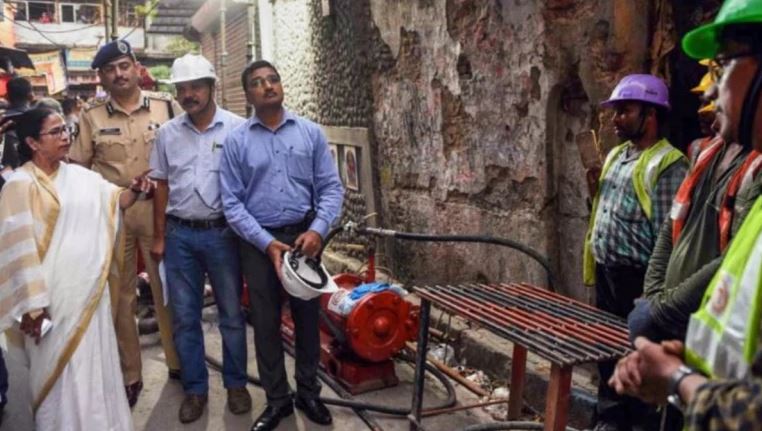A West Bengal Minister was among over 400 persons forced to evacuate their residences and shops in the heart of the city after more than 50 buildings developed cracks — and several collapsed — apparently due to tunnelling work.

West Bengal Minister was among over 400 persons forced to evacuate their residences and shops in the heart of the city after more than 50 buildings developed cracks — and several collapsed — apparently due to tunnelling work for the under-construction 16.60-km East West Metro Railway project — a part of which constitutes India’s first under-river train line.
The project — technologically analogous to the Eurostar (connecting Paris and London) — met with what the implementing agency Kolkata Metro Railway Corporation Limited (KMRCL) called an “unprecedented disaster” on August 31, when a tunnel boring machine hit an aquifer resulting in water and silt gushing in and triggering serious ground loss on several roads in central Kolkata’s Bowbazar area — close to the city’s bustling office and business hub Esplanade and Dalhousie.
While 10 buildings developed cracks on August 31, the number increased to 20 the next day and climbed up to 52 till Thursday, prompting authorities to shift more than 400 dwellers to hotels or guest houses in the vicinity. At least two buildings have caved in.
Among those asked vacate their residences by senior KMRCL officials was state Planning and Statistics Minister Tapas Roy as a precautionary measure as cracks have appeared in most adjacent buildings. Roy, who has been residing at BB Ganguly Street for over a decade, termed the situation “unfortunate”.
Meanwhile, the KMRC has announced a relief of Rs 5 lakh to each household evacuated in a sudden/unplanned manner following damage to their residence.
“The KMRCL board of directors have decided to immediately release Rs 5 lakh per family to those affected,” it said in a statement.
The order to vacate “immediately” came to families on Durga Pituri Lane, Babu Ram Seal Lane and Gour De Lane.
Anindita Dey, 25, is scheduled to get married on December 1. Her family was given “10 minutes” on Monday to take out their valuables and important documents. But before they could get anything out, the building collapsed burying their belongings in the rubble.
The Dey family, now lodged in a hotel by the KMRCL, is now banking on the announced Rs 5 lakh compensation and Chief Minister Mamata Banerjee to see through the wedding.
The KMRCL has promised to reconstruct or repair the damaged buildings, and provide the shifted residents flats on rent if their hotel stay “is prolonged”.
The agency has also engaged several experts “of both national and international repute” for addressing the issue in the best possible manner”, the statement said.
“International experts namely Paul Vireli (tunnel expert from South Africa), Guy Bridges (Hong Kong), geotechnical engineer John Endicott (Singapore), grouting expert Kiril Shramka (Russia) and Kumar Pitchumani from Chennai are already in Kolkata,” it said.
According to KMRCL, the tunnel boring work has been stopped and would resume only after a green signal from the court. Company officials fear that the project could be delayed by at least a year, leading to a massive cost escalation.
The court will hear the matter on September 16.
Meanwhile, state Urban Development Minister Firhad Hakim has sought Railway Minister Piyush Goel’s intervention to control the damage and ensure proper rehabilitation of the affected denizens. Hakim also charged the KMRCL with negligence that has caused the “massive human suffering”.
The Chief Minister, who reviewed the situation with KMRCL authorities, experts, police and administrative officials earlier this week, has decided to form a core group comprising the Chief Secretary, Home Secretary, City Police Commissioner and representatives of affected houses and shops to look into the tunnelling related problems.
The Metro corridor bridges the twin cities of Howrah and Kolkata — two of the most populous areas — has been planned to drastically cut down travel cost and time, almost by an hour and a half.
The Metro would run from Salt Lake’s Sector V, Kolkata’s IT hub, and Howrah Maidan. Out of the total 16.60 kms, 5.8 km is an elevated corridor and 10.8 km will run underground. The 520-metre twin tunnels under the river are part of the underground stretch.
Once commissioned in 2019, one would travel more than a 10-storied building below the water surface for almost half a kilometre across the 460 metre-wide Hooghly.
The Metro project — connecting two of the world’s busiest railway stations Sealdah and Howrah — was originally slated to be operational by 2012, but the deadline has got pushed back repeatedly due to land and other issues.
The affected section — from Esplanade to Sealdah — is a 2.45 km stretch. The tunnel boring machine was about 600 metres from Sealdah when disaster struck. The projected daily maximum passenger load is nine lakh.
